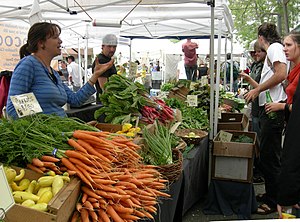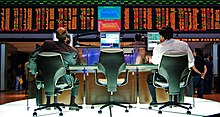|
Economics   Economics is the social science which studies economic activity: how people make choices to get what they want. It has been defined as "the study of scarcity and choice" and is basically about the choices people make. It also studies what affects the production, distribution and consumption of goods and services in an economy.[1] Investment and income relate to economics.[2] The word comes from Ancient Greek, and relates to οἶκος oíkos "house" and νόμος nomos "custom" or "law".[3] The models used in economics today were mostly started in the 19th century. People took ideas from political economy and added to them because they wanted to use an empirical approach similar to the one used in the natural sciences.[4] Subjects and objects in economicsThe subjects (actors) in economic study are households, business companies, the government (the state), and foreign countries. Households offer their "factors of production" to companies. This includes labor ,land, capital (things like machines and buildings) and information. In exchange for their factors of production, households get income which they use to consume (buy) goods from firms representing consumption expenditure. Business companies produce and sell goods and services and buy factors of production from households and from other companies. The state or public sector includes institutions and organisations. The state takes some of the earnings from the business companies and households, and uses it to pay for "public goods" like street lights or defense systems, to be available for everyone. The last subject is foreign countries. This includes all households, business companies and state institutions, which are not based in one's own country. They demand and supply goods from abroad. The objects (things acted upon) in economic study are consumer goods, capital goods, and factors of production. Consumer goods are classified as "usage goods" (for example, gasoline or toilet paper), as "purpose goods" (for example, a house or bicycle), and as "services" (for example, the work of a doctor or cleaning lady). Capital goods are goods which are necessary for producing other goods. Examples of these are buildings, equipment, and machines. Factors of production are work, ground, capital, information, and environment. General economic rules
History
The ideas that economists have depend a lot on the times they live in. For example, Karl Marx lived in a time when workers' conditions were very poor, and John Maynard Keynes lived through the Great Depression of the 1930s. Today's economists can look back and understand why they made their judgments, and try to make better ones. Branches of economicsThe two main branches of economics are microeconomics and macroeconomics. Macroeconomics is about the economy in general. For example, macroeconomists study things that make a country's wealth go up and things that make millions of people lose their jobs. Microeconomics is about smaller and more specific things such as how families and households spend their money and how businesses operate. There are a number of other branches of economics:
Famous economistsFamous economists in history include:
Famous economists of the 19th and 20th century include Friedrich August von Hayek, Wassily Leontief, Carl Menger, and Léon Walras. Related pagesReferences
Other websitesWikimedia Commons has media related to Economics.
|
